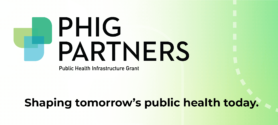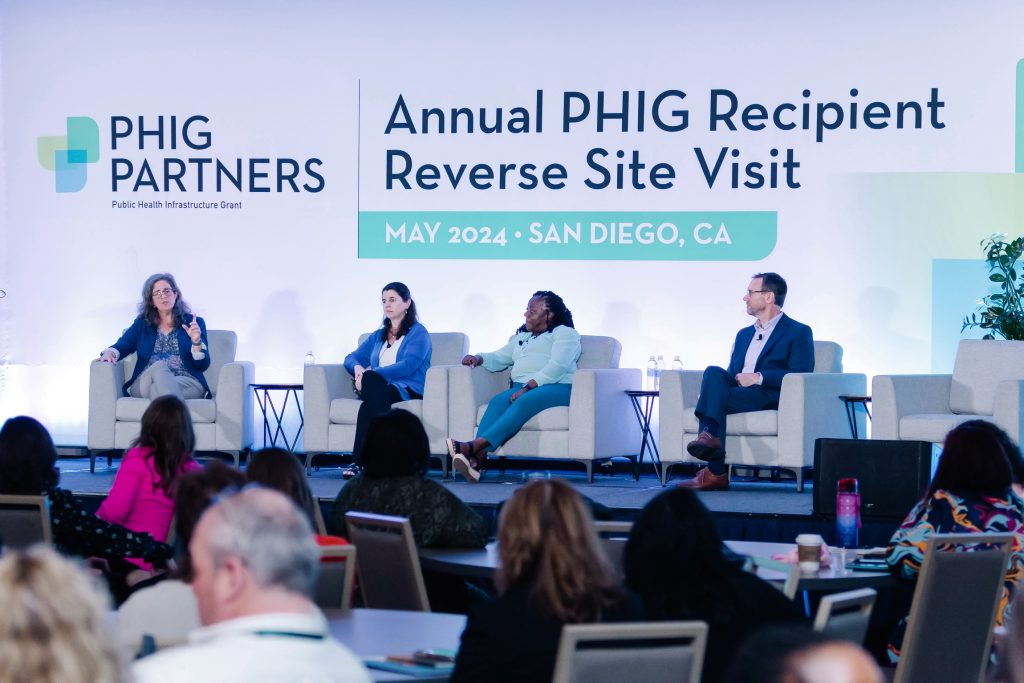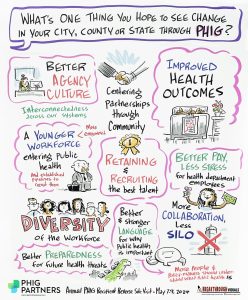CDC Director champions data sharing, partnership & storytelling during 2024 PHIG Reverse Site Visit and DMI Workshop
- By: Chloe Lake
- Date
On May 6-9, 2024, hundreds of public health professionals convened in San Diego to attend the Data Modernization Initiative (DMI) Workshop and the second Annual Public Health Infrastructure Grant (PHIG) Recipient Reverse Site Visit. Both events convened PHIG recipients to facilitate collaboration, expand our shared knowledge base, and spotlight recipient progress toward individual and shared goals related to the public health workforce, foundational capabilities, and data systems.
This year’s event was hosted by the National Network of Public Health Institutes (NNPHI), with support from a dedicated planning committee made up of staff from the Association of State and Territorial Health Officials (ASTHO), the Public Health Accreditation Board (PHAB), and CDC.
“It is a tremendous honor to partner with ASTHO, CDC, PHAB, and PHIG recipients on this historic national program,” said Vincent Lafronza, NNPHI President and Chief Executive Officer, continuing, “I found the presentations on program progress from our health department leaders to be inspiring, and look forward to our continued efforts dedicated to strengthening foundational public health services throughout the nation.”
By the Numbers
- Over 150 people attended the DMI Workshop, while over 550 attended the reverse site visit in person. In addition, over 120 participants participated in the limited virtual experience.
- 105 recipient jurisdictions were represented in person, with the remaining joining virtually.
- The event featured over 120 speakers and panelists across various breakout sessions and plenaries, drawing from recipient health departments, technical assistance partners, PHIG national partners, and CDC.
Highlights from the Week
Sessions were organized around core PHIG focus areas, including data modernization, public health foundational capabilities, workforce recruitment and development, evaluation, equity, and communications. Preliminary evaluation results indicate that most attendees intend to apply what they learned during the events, with many indicating that they’ve already initiated interagency partnerships as a result of their participation.
In addition to the wide breadth of content covered, event highlights included:

CDC Director Mandy Cohen (left) sits down for some recipient Q&A with Stacey Mattison Jenkins, Director of the Division of Jurisdictional Support in CDC’s Public Health Infrastructure Center.
Special Remarks by the Director of the CDC: We were honored to have Dr. Mandy Cohen, CDC Director, as a surprise speaker on May 7. Dr. Cohen’s remarks on the importance of data modernization, fostering new and existing partnerships, and demonstrating our impact on the communities we serve were timely and energizing. “We will be set for success if we are showing people how this grant is working,” Dr. Cohen emphasized, “We need to show folks how the work and the investment is translating into better health in their communities.” Dr. Cohen also spent time answering questions submitted by recipients and helped refocus attention on how we can leverage PHIG to address big-picture needs and opportunities in public health.
Focus on Data Modernization: The DMI Workshop was the first of its kind and allowed for a much-needed spotlight on this aspect of the grant. One attendee noted, “The DMI workshop finally helped me fully understand what TEFCA [the Trusted Exchange Framework and Common Agreement] is and how it can benefit my organization.” For PHIG recipients and partners interested in DMI who were unable to attend the invite-only workshop, a DMI track was offered throughout the larger Reverse Site Visit.
Relationship-Building and Networking: Preliminary event evaluation results show that networking opportunities across both events are invaluable. Attendees noted that curated spaces and time to share resources, troubleshoot common challenges, and identify effective practices are critical to this grant’s success.
As one attendee said simply, “Thank God I’m not alone.”
Onsite Storytelling: During the event, attendees were invited to participate in filmed interviews to help tell the story of PHIG through the lens of their own experiences. 41 attendees completed interviews, which will be used to create video campaigns designed to humanize public health infrastructure work, forecast the larger impact of PHIG, and inspire the next generation of public health workers.
A graphic recorder also created visual stories onsite to highlight key points from plenary sessions and attendee Q&As.
Considerations for Diverse Attendee Needs, Mental Wellness, and Environmental Impact: As part of an effort to create safe, comfortable spaces for all, NNPHI’s convenings team designated Personal Use and Community Health rooms to offer attendees options for privacy (for prayer or lactation) or a moment to reflect and refocus. Attendees noted in the evaluation survey that these spaces are important to their continued engagement in session content.
NNPHI also implemented several eco-friendly practices, including recycling or reusing most name badges, lanyards, and event signage, and using an online app for the event agenda and session details instead of printed materials.
Next Steps
Attendees can find session slides and recordings (when available) in the event app. You can view and download event photos using this link. The DMI Workshop and PHIG Reverse Site Visit planning committee will review the final event evaluation results to determine areas for improvement and aspects to replicate next year or during interim convenings. PHIG National Partners, technical assistance partners, and CDC PHIG staff will also use what they learned from recipients during these events to inform proactive technical assistance offerings, grant administration and guidance, and other activities such as evaluation and success story collection and publication.
As always, all PHIG recipients have access to on-demand technical assistance through the PHIVE portal and are encouraged to submit requests based on ideas sparked during both events. Recipients and external partners can stay updated on the latest PHIG developments, resources, and stories through the PHIG Connections monthly newsletter and PHIG Partner website.
Thank You to Every Planner, Speaker, and Attendee
NNPHI and the PHIG National Partners deeply appreciate the effort and planning that recipients and partners invested in planning and attending these events. We acknowledge and appreciate the dedication of every attendee, especially those who traveled long distances to join us – some even spent over 20 hours on planes to be part of these critical discussions. Managing time away from staff, projects, and personal obligations, either virtually or in-person, is no small feat. It was impressive to see hundreds of attendees remain fully engaged throughout the three days—four, for some! Thank you for your enthusiasm, participation, and insights.
This work is supported by funds made available from the Centers for Disease Control and Prevention (CDC) of the U.S. Department of Health and Human Services (HHS), National Center for STLT Public Health Infrastructure and Workforce, through OE22-2203: Strengthening U.S. Public Health Infrastructure, Workforce, and Data Systems grant. The contents are those of the author(s) and do not necessarily represent the official views of, nor an endorsement, by CDC/HHS, or the U.S. Government.






 Subscribe To Our Communications
Subscribe To Our Communications